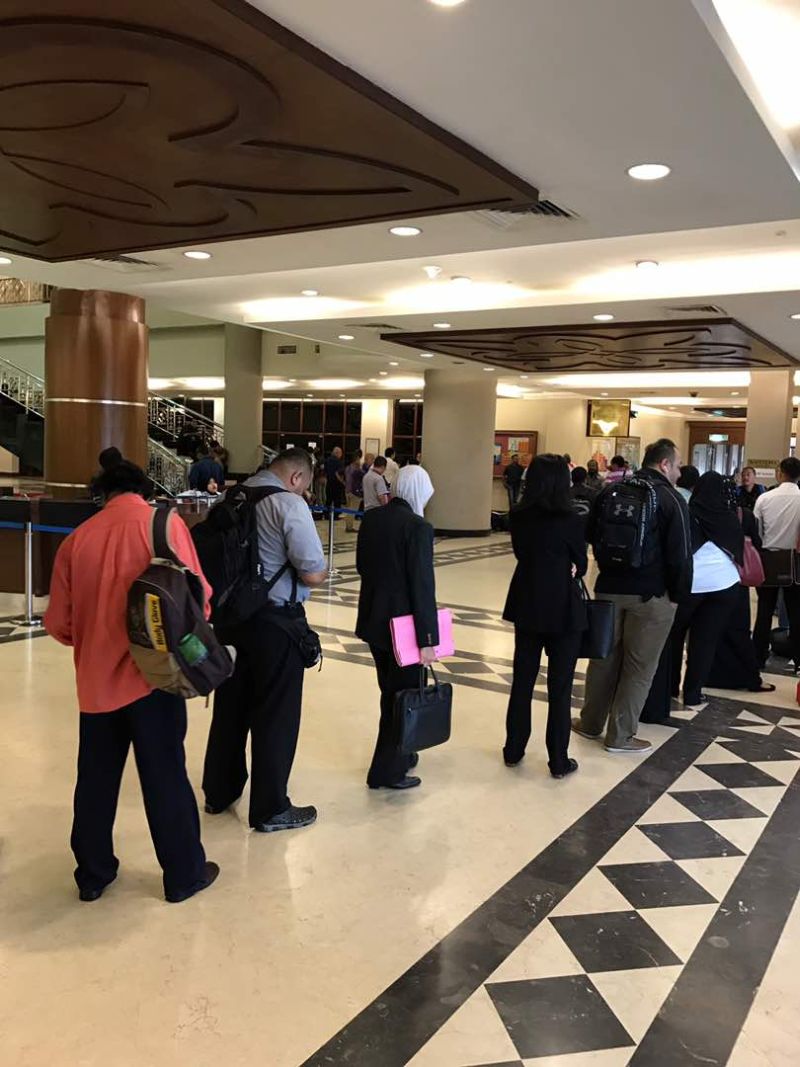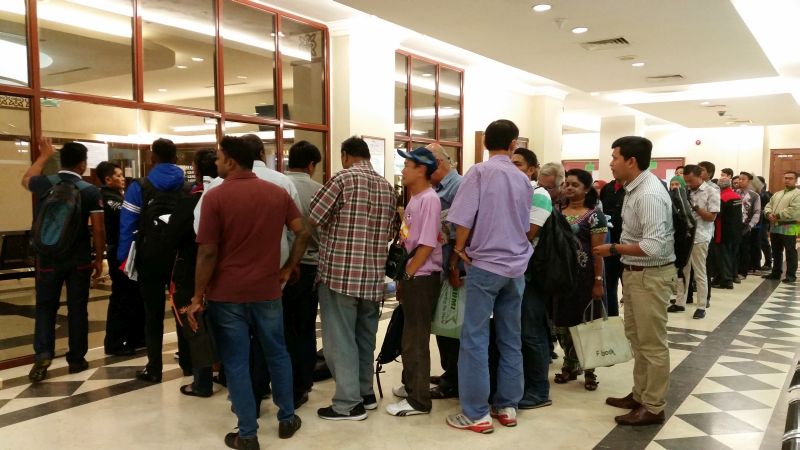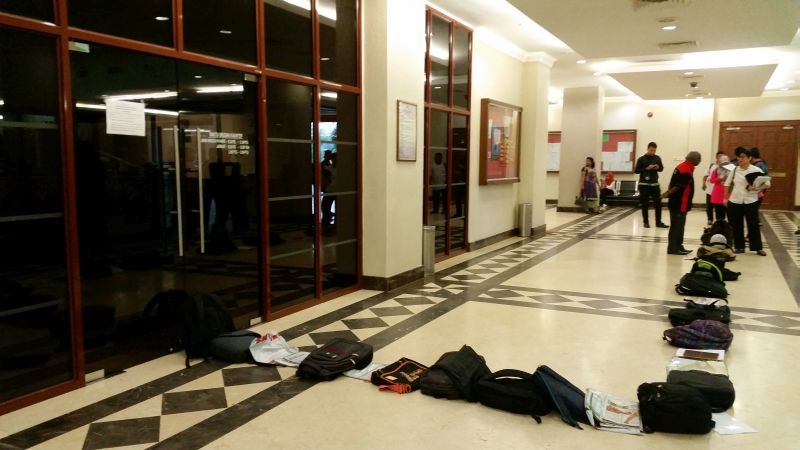KUALA LUMPUR, Aug 13 — Lawyers’ staff no longer need to go to court here before dawn to beat the queue and to file documents as the judiciary claims that initial problems with a new e-filing system have been resolved.
Malay Mail Online was told that office clerks and despatch workers even had to be at the Kuala Lumpur court complex by 5am or 6am as recently as June and July, just to get the limited 200 queue numbers issued daily or risk having to return another day to file their documents.
When contacted, the judiciary’s e-Kehakiman division said the “sudden increase” of users at the KL Court e-filing service bureau’s counters during the transition period in June was due to “teething problems” faced by those who were trying to migrate from the E-Court system’s first phase to the second phase.
Some of them had to do filing at the service bureaus then, it said.
“The teething problems for online filers had been sorted out and as at [July 31, 2017], number of users at the service bureau had significantly reduced and there is no longer a need to impose any quota for issuance of queue tickets,” it said in an email response last week to Malay Mail Online’s queries.
“There is no more problem of long queue,” it said.
The e-filing system was introduced in March 2011 and was one of four components of the E-Court system for peninsular Malaysia, which underwent an expansion and upgrade to phase two during May to July.
This online system allows law firms to file court documents at anytime and anywhere — even for a case in another state, instead of being bound to the courts’ office hours. Courts also use this system instead of keeping physical documents like in the past, with the courts’ filing counters now known as e-filing service bureaus where court staff help with the online filing of documents.
Foong Cheng Leong, the Kuala Lumpur Bar’s Information Technology and Publication Committee chairman, said issues that law firms in peninsular Malaysia faced in moving to a new online court filing system had caused the long queues.
During that period, the helpdesk for the online system was overflowing with requests for assistance, with many lawyers complaining that it was not picking up their phone calls, he said.
“I think the long queues at the e-filing service bureau is due to the sudden surge of requests to do e-filing. As many lawyers had problem migrating to the new system, they have no choice but to use the e-filing service bureau. This adds to the usual crowd of lawyers who did not subscribe to the e-filing system.
“The Court was unable to cope with the sudden surge of request and resulted in very long lines. The Court had to limit the number of people who could use the service otherwise their staff would be staying in Court past the normal working hours,” he told Malay Mail Online when asked to weigh in on the issue.
The Kuala Lumpur Bar had on July 14 posted a notice to its members to address issues related to e-filing, while the Malaysian Bar had also on July 5 issued a circular to tell its members that it was following up with the courts on complaints such as the long queues and limited number of filings accepted daily at the e-filing service bureaus.

Kuala Lumpur lawyer Colin Andrew Pereira, whose office clerk had to be at the court by 5am due to the long queues, said he was planning to start using the e-filing system soon.
Noting that filing in court was previously an efficient process, he claimed that the limited queue numbers issued daily was intentional to push lawyers to use e-filing.
“We interpret it to mean they are making it deliberately inefficient just to encourage people to do efiling from their own office,” he told Malay Mail Online late last month, arguing however that “they can’t have two systems and make one system inefficient”.
Already nudging lawyers in the direction of going digital is the RM1 fee for every page of document that e-filing service bureau staff converts into a digital version by manually scanning it into the courts’ server, as the alternative of paying RM10 to submit a CD containing the soft copy of documents you pre-scan at your office would be far more economical if you have bulky documents to file.
These fees are part of standardisation of a list of e-filing service bureau charges that kicked in on August 15, 2014.
But eventually these fees would be unimportant for lawyers, as the judiciary’s e-Kehakiman division recently told Malay Mail Online that all law firms will be required to file their documents online directly through the https://efs.kehakiman.gov.my website by the end of December 2017 and that this is “based on consensus with Bar Council”.
Quota and queues
During Malay Mail Online’s visit to the Kuala Lumpur court complex on July 27, the queue appeared to have tapered off to a manageable level of about 20 queuing at 7.10am and about 50 people in the line by 7.50am.
Bags, newspapers, documents served as their stand-in for the queue. Each person is usually entitled to two queue numbers, as limited filings can be done with each queue number.
This is in comparison to accounts of the queue stretching twice as long during the transition period and snaking all the way to the main glass doors of the KL court complex, with complaints to Malay Mail Online of missed or near-misses of urgent filings as numbers ran out in the initial stages.
The filing counters’ official office hours start from 8.30am, but queue numbers are issued as early as 8am.

The long queue issue appeared tied to the limit on queue numbers issued, with runners telling Malay Mail Online on July 27 that filing documents at court used to be an efficient process where they could walk in anytime during the counter hours instead of lining up for the 200 numbers issued daily.
A despatch worker only wishing to be identified as Amydy used to come at 4.30am during June and July and even once at 3.30am last month — well before the gates to the KL court complex open at 6am, usually ending up at the top of the queue and finishing the filing process as early as 9am or 10am.
Amydy has been continuing the practice of coming before dawn at around 4.30am or 5am to court even this month, and spotted about two to three bags that were already in the queue Wednesday at around 5.30am.
But Amydy told Malay Mail Online that the queue has become noticeably shorter as lawyers switch to using e-filing, noting that there were about only about 80 numbers issued Wednesday morning.





















